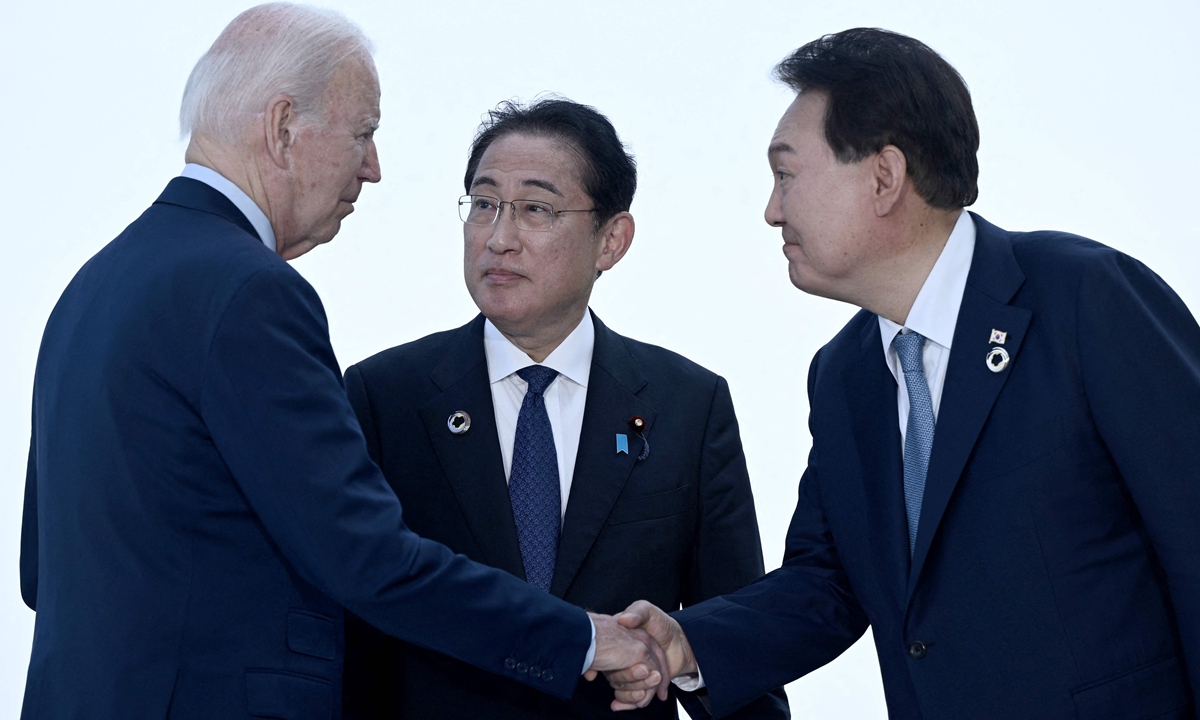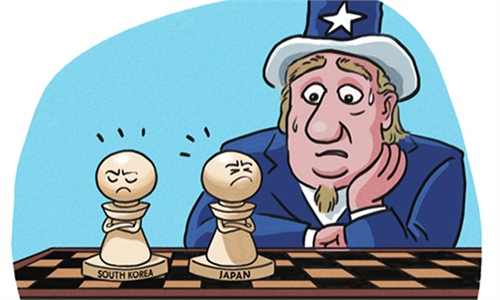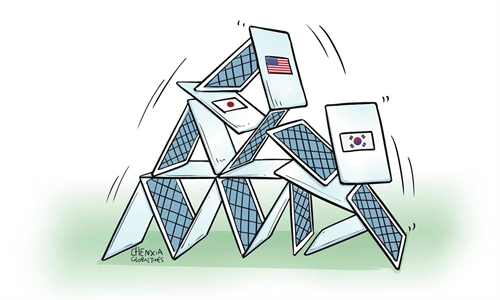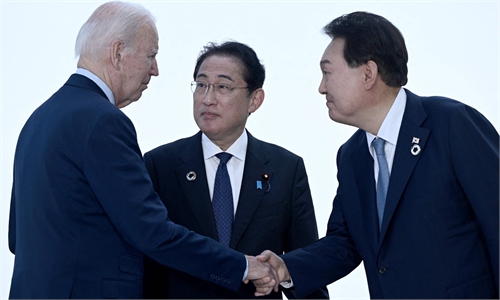Does S.Korea know the implications of wading into this muddy water?: Global Times editorial

US President Joe Biden, Japan's Prime Minister Kishida Fumio and South Korea's President Yoon Suk-yeol (from left to right) greet each other ahead of a trilateral meeting during the G7 Leaders' Summit in Hiroshima on May 21, 2023. Photo: VCG
The various pieces of information released beforehand indicate that the tri-country summit of the US, Japan, and South Korea, scheduled for August 18 at Camp David, will sound the trumpet for moving into the "new cold war." This is an ominous signal for Northeast Asia and even the world. The Korean Peninsula issue is a legacy of the Cold War. Today, the unresolved remnants of the old Cold War still persist, and South Korea acts as an inaugural member to promote the "new cold war." This is not a historical coincidence; behind it lies a hidden hand stretching over from across the Pacific, manipulating events in the shadows.
We can now roughly piece together the fundamental outline of this summit: It is cloaked in the banner of safeguarding "shared security" and aims to forge a new security bloc. In its structure, it accentuates ideological hues and value disparities, while in its approach, it exhibits clear inclinations toward exclusivity, competition, and camp-based confrontation. Trilateral cooperation covers political, military, economic, technological, and various other facets, with each of these "cooperative" aspects embodying the aforementioned characteristics. The direct consequence of this is the deliberate creation of distinct camps in the Asia-Pacific region, coercing other nations to pick sides.
Undoubtedly, during the "preparation" for the summit, Washington has been the most active participant, actively leaking most of the summit's content in various forms. We've observed that Washington exudes a palpable sense of urgency: Due to concerns that the unilateral diplomatic concessions for reconciliation by South Korea toward Japan might not be sustainable, thereby destabilizing the foundation of trilateral cooperation, it perceives the current moment as a rare "opportunity." Consequently, there is a need to "act swiftly" to institutionalize the cooperative framework, with the aim of making it more difficult for future leaders to reverse the situation.
In this context, we wish to particularly caution South Korea, as it stands as a crucial variable propelling the emergence of "new cold war" tendencies in the region. We highly doubt whether the South Korean authorities truly understand what this muddy water they are wading into means for South Korea. If they were fully aware, they wouldn't exhibit the current level of excitement and eagerness upon receiving their "Camp David summit" ticket, resembling a kindergarten child receiving a sticker from their teacher. Instead, they would be filled with a sense of deep trepidation and caution, as if on the edge of an abyss or treading on thin ice. They would find this ticket extremely challenging to handle.
Compared to the other two members with ulterior motives in the alliance of the US, the perception of the regional situation and global situation displayed by the South Korean authorities appears to be both radical and simplistic. Based on such perception, the choices made are unlikely to navigate the exceedingly complex geopolitical reality of Northeast Asia. As a major victim of the "remnants of the Cold War," South Korea should have been one of the most vigilant and concerned countries against the "new cold war." How could it willingly align itself with it?
Previously, South Korean media warned that the Yoon Suk-yeol government is falling into the vortex of the "new cold war," which is a huge pit for South Korea and could potentially bury the social and economic wealth it has accumulated over the past few decades. In recent years, South Korea has strived to achieve a relative balance in diplomacy and strategy amid geopolitical pressures, and has achieved remarkable economic and social development. However, this crucial relative balance for South Korea is being disrupted by the Yoon government internally, and by Washington and Japan externally.
Why don't we discuss the US and Japan, but instead single out South Korea? It's because we believe that the US and Japan are actively doing so with hidden motives, and leave no room for change over certain issues. But we hope that South Korea can remain rational and clear-headed at this critical juncture, not only for its own sake but also for the interests of the Korean Peninsula and Northeast Asia. If South Korea firmly opposes all forms of the "new cold war," it can play an irreplaceable role. Both China and South Korea have common interests and positions in terms of the peace and stability of the Korean Peninsula, as well as the denuclearization of the peninsula.
"The Camp David summit" emphasizes it focuses on addressing the so-called "North Korean threat," and the three parties involved have intentionally downplayed any targeting of China. It is said that there may be because of South Korea's opinion, as it is unwilling to label China as a "competitor" or "challenge" like the US and Japan, to the extent that China and South Korea may turn against each other. If this is true, it indicates that South Korea is still aware of the current situation. However, further deepening military cooperation between the US, Japan, and South Korea is the most substantial topic of the "Camp David summit," and it is obvious who it is aimed at.
The US has a large number of troops stationed in both Japan and South Korea. In the past, the focus was on the bilateral alliances between the US and Japan, as well as the US and South Korea. Now, under the coordination and dominance of the US, through the "Camp David summit," the intention is to integrate the US-Japan alliance and US-South Korea alliance into a trilateral alliance, especially in terms of military cooperation, which some people refer to as the "mini NATO" of the Asia-Pacific region. This is clearly a major move by the US to promote the layout of the "new cold war." Regardless of how the US disguises it, it cannot hide the color of the "new cold war." The seriousness of its consequences does not need to be reiterated. We once again strongly urge the international community to take action against the "new cold war."



